
Discover more from Frederick R. Smith Speaks
The Double Standards of Professional Sports
Examining Unprofessional Behavior, Disproportionate Salaries, and the Hypocrisy of Some Players and Fans
All my tattoos, they’ve been thought out, thought over, been a work in progress for at least a year before I’ve got them. So I’m not walking into a tattoo shop, picking tattoos off a wall. It’s something that means something to me. It’s something that I believe in.
Colin Kaepernick
Words 2,399 | Read Time 11 min | Enjoy
Introduction
Professional sports are a big part of our culture. They entertain and unite us. Their thrilling games and stories captivate millions. Their influence extends beyond entertainment, shaping our cultural landscape and reflecting societal values. Yet beneath the surface of this vibrant spectacle lies a complex web of troubling behaviors and systemic issues. This essay explores major issues in professional sports. These include some players’ poor conduct, huge salaries, and the hypocrisy of select athletes and fans. These issues reflect our crummy, postmodern values. They demand our attention and scrutiny.
While providing entertainment and fostering community, some players exhibit behaviors and dynamics that can be troubling. Among these concerns are the unprofessional behavior, the disproportionate salaries they command, and the hypocrisy of some players and fans. These issues contribute to a growing disenchantment with professional sports, reflecting deeper societal issues. It is crucial that we, as a society, actively engage in discriminating thinking about these issues, as they have far-reaching implications for our society and the values we (at one time) upheld.
Unprofessional Behavior of Players
Several athletes have failed to maintain a professional demeanor. One prominent example is the recent and thankfully waining debate surrounding players kneeling during the national anthem. This action, first seen with NFL QB Colin Kaepernick, was a peaceful protest against racial injustice and “police brutality.” It sparked a backlash. Critics accused the players of disrespecting the flag and undermining national pride.
Before moving on, I do not intend to lump Kaepernick in the criminal bucket. The putrid SPLC sandwich smear is an abhorrent Marxist behavior we must avoid!
Another example of unprofessional behavior includes various incidents of off-field conduct that have tarnished the reputation of athletes. High-profile cases of criminal activities, such as domestic violence and substance abuse, have raised questions about the ethical standards expected from those in the public eye. These incidents reflect poorly on the individual athletes, the institutions that employ them, and the fans who support them. Here are some examples of professional athletes who have faced criminal convictions:
In 2015, a former NFL player for the Patriots, Aaron Hernandez, was convicted of first-degree murder for killing Odin Lloyd in 2013. Hernandez was serving a life sentence without parole when he was found dead in his prison cell in 2017.
NFL running back Ray Rice engaged in a high-profile case in 2014 when a video surfaced showing him assaulting his then-fiancée in an elevator. The NFL suspended Rice indefinitely, and the Baltimore Ravens released him. The charges were later dismissed after he completed a pretrial intervention program.
In 2007, the NFL quarterback Michael Vick was convicted of participating in an illegal dogfighting ring. Vick served 18 months in federal prison and faced significant public backlash. After his release, he returned to the NFL and has been involved in various animal welfare initiatives.
Former NBA player Lamar Odom faced legal troubles, including drug-related arrests. In 2015, Odom was found unconscious in a Nevada brothel. He then faced legal issues over substance abuse and his role in the incident.
NFL quarterback Deshaun Watson faced many sexual misconduct allegations and lawsuits. Not all legal proceedings ended in criminal convictions. But they drew much scrutiny, which led to a long NFL suspension.
NHL player Mike Danton was arrested and charged with conspiracy to commit murder. The charges were related to an alleged plot to hire a hitman to kill his agent, David Frost.
Former NHL player Ryan Malone was arrested and convicted of DUI and cocaine possession. During the arrest, police found 1.3 grams of cocaine in his pocket. Malone pleaded no contest to the DUI charge and agreed to a pretrial diversion program for the cocaine possession charge.
These cases are a sampling of many. They show that criminal behavior in athletes can have widespread effects. It can damage their careers, reputations, and the public’s view of sports. The criminal behavior of a few pro athletes is notable. But still, it is a fraction of a larger group of players. Most of them follow high standards of conduct. The media often treats these incidents as “second-page” stories. That reflects a profit-driven agenda that prioritizes ratings over a balanced view of sports. It also shows the stark reality of the media’s slanted coverage (or lack thereof) of all other news items.
Disproportionate Salaries
Professional athletes’ salaries are often astronomical. Top players earn multi-million-dollar contracts. NBA star Stephen Curry’s $215 million, four-year contract with the Warriors shows the huge rewards elite athletes enjoy. Mike Trout of Major League Baseball lands a $426.5 million deal. These figures are staggering. They are especially outlandish compared to the pay of average workers. It overshadows the truly important life-saving professionals like police and health workers.1
These high salaries can disconnect athletes from the public. Some people feel they are too high, given the athletes’ contributions to society compared to other professions. The wealth of professional athletes often fuels perceptions of unfairness. It also worsens the gap between the rich and the rest.
Hypocrisy
Many athletes have ultra-high salaries, and some exhibit hypocrisy. They advocate for social and economic justice but enjoy systems that perpetuate inequality. For example, players who support social justice may criticize income inequality. Yet they may enjoy the benefits of their high salaries. The gap between their words and finances can hurt their credibility. It may also make them seem insincere.
Athletes who flaunt their riches in an opulent lifestyle stand in stark opposition to their poverty advocacy efforts. This contrast may raise doubts about their true commitment to the causes they support.
Some fans also contribute to this complex issue through their form of hypocrisy. Some people decry the vast wealth of the “elite” or “rich.” Yet, they often support and celebrate athletes with exorbitant salaries. Fans’ enthusiasm and money (buying pricey tickets and gear) sustain athletes’ high salaries. This support shows a paradox. The fans who deplor income inequality fund the system that keeps it alive.
Meanwile, the dogmatic secularists bemoan those who go to an orthodox-inclined church once a week as religious zealots. Worse, these faithful people minding their own business get tagged with the manufactured pejorative “Christian Nationalist.” The FBI is right on it, like white on rice, because CNN talking heads never use the word ANTIFA. That uber-fascist group deserving of the FBI’s attention is touted as fiction because the intellectual giants with pea brains say so. For additional confirmation via the latest cutting-edge intelligence about the supposed overarching right-wing nexus, take a spin at the SPLC. It is a relief to find out there is no such thing as left-wing.
The above notwithstanding, to worship sports players daily is just dandy. After all, there is no collection basket, but in its place, there is a $200.00 ticket to watch a “premium team” sparring at the modern Colosseum. The second collection is a $10.00 hots doggy with a $6.00 soda pop with carbon dioxide! Good for the economy and environment. Furthermore, the carbon-conscious take the train or use their EV to get to their favorite sports event. Through this selfless act, they proudly project a cozy virtue signal: carbon footprint mitigation (reduction in an essential plant nutrient).
Good Guys Trashed
Many people have praised and critiqued Tim Tebow, a notable example of a football player with strong beliefs. Tebow, a former NFL quarterback and college football star, expresses his outspoken classic Christian faith. It has shaped his public persona. His dedication to his faith was clear in college. He often used Bible verses in his eye black during games. He also spoke about his beliefs on his platform.
Tebow’s faith extended beyond football to his public speaking. Many applauded his unwavering commitment and message. But, of course, some criticized his “overly preachy” or “self-righteous” approach. Critics argued that his focus on religion sometimes overshadowed sports’ secular nature. They feared his displays of faith might alienate non-believers. Yet the dogmatic secularists have “their way” with the rest of us.
Tebow’s faith inspires both admiration and debate. This split shows athletes’ issues when mixing their beliefs with their work. His faith is central to his identity. Yet the dogmatic secularists regurgitate tired quips about “appropriate boundaries.” It is a new, notable wall that separates select personal beliefs from public personas in sports.
Adding to the discourse, some good and well-intentioned Christians openly show their disdain for Catholicism, adding to the cauldron. That’s just what the dogmatic elite secularists want: division. Let’s put aside our differences and focus on our agreed-upon item. Like the Son in the Star Trek episode shown in the Conclusion below. If not, we are playing into the hands of the nasty narrative. Meanwhile, even “catholics” do not like NFL star Harrison Butker because he is a traditionalist. Thus, gosh forbid, he is too Catholic for many squishy “catholics.” Oh, please!
Reflection
Many, including friends and family, may not accept my view. Yet, we must not ignore the truth about the media’s obsession with scandals. It exploits scandals and sensational stories that bolster its bottom line. Thus, the media overlords find it expedient to sideline news unsuitable for print.
Some athletes engage in troubling behaviors. It’s disheartening to see a system that values profit over integrity. It values sensationalism over balanced reporting. While this critique may be uncomfortable, it must express my genuine feelings. Acknowledging these issues is a step toward a fairer conversation about the role of professional sports in society.
Professional sports, once a bastion of wholesome entertainment and community spirit, have transformed into a complex arena fraught with issues of commercial exploitation and ethical concerns. In the past, we celebrated sports for bringing people together, inspiring fair play, and providing entertainment that resonated with values of integrity and teamwork. Society saw athletes as role models whose dedication and sportsmanship embodied the best human spirit. However, as the industry has evolved, the focus has shifted toward profit and sensationalism, overshadowing the fundamental ideals that once characterized professional sports. This transformation, in which fans have played a significant role, reflects a loss of the sport’s simpler, more genuine aspects that initially drew fans in and fostered a sense of unity and purpose.
Conclusion
Professional sports have many issues. They include unprofessional player behavior, high salaries, and hypocrisy among athletes and fans. These concerns reflect societal issues. They fuel a growing disillusionment with professional sports. To fix these problems, we must examine the industry’s people and the consumers who support the system. These dynamics can inspire deeper engagement with sports and a fairer society.
Those who get pleasure out of professional sports go and enjoy! Remember that it has rough edges like all other aspects of society, particularly in our postmodern dystopia. We can support plenty of honest players (they need it). We can press on by not allowing it to overtake our view of reality. We can make a difference one person at a time with balanced, good behavior that others can emulate. The bottom line is that it is all about bread and circuses.
That, my friends, is my all-time favorite scene from the original Stark Trek! Take it ahead, warp factor one.2
Parting Shot
Judd Garrett (NFL player and coach, retired) provides the following concerning the opening ceremony of the 2024 Summer Olympics in France:
It seemed like everything that I believe in was openly mocked at the Olympic opening ceremonies last night. LeBron James was chosen as one of the two Americans to carry the United States flag in the opening procession. Really? LeBron James, the person who has disrespected the America flag for years, was the one chosen to carry the flag? They could have chosen one of the ten former service men or women who are on our Olympic team to carry our flag. The people who have actually risked their lives defending the flag should have had the honor of carrying the flag, not a person who has spent the last decade disrespecting the flag and the country. What has LeBron ever done to deserve that honor? He stands up for and defends China more than he stands up for and defends the United States of America.
But to LeBron James carrying the United States flag at the Olympic ceremony was not about honoring the United States, it was about honoring LeBron James. LeBron is only about LeBron. When carrying the flag puts the spotlight on him, he is all for the flag. When disrespecting the flag, puts the spotlight on him, he is all for disrespecting it. So, carrying the flag in the opening ceremony was not about honoring the flag and all it stands for, but glorifying LeBron. He doesn’t see it as an honor to represent the United States, he sees the honor was that he was chosen over the 590 other athletes on the US Olympic team. So, the person who has used his vast platform to show nothing but disdain for the United States is the one chosen to represent the United States. It was almost as if the US Olympic committee chose to openly mock the United States in the opening ceremonies. And maybe that was the point.
Anti-Woke Closing
Play it often; play it loud. Irriate the Willfully Overlooking Known Evil (WOKE) ecosystem. 📕
I warmly encourage you to consider becoming a paid subscriber if you have the means. Tips are appreciated, too. Regardless of your choice, your support is deeply appreciated. From the bottom of my heart, thank you for your invaluable support!
With Diversity Inclusion Equity (DIE), sadly, many of these professionals are now absorbed into the leftist death culture. The lousy-looney-leftist (L3) elite and their perverted-putrid-Pavlovian-puppets (P4) are willing to DIE for their cause to usher in their version of a utopia, which is a dystopia.
This scene is a dichotomy as Gene Roddenberry (Star Trek creator) despised religion and promoted a New World Order.






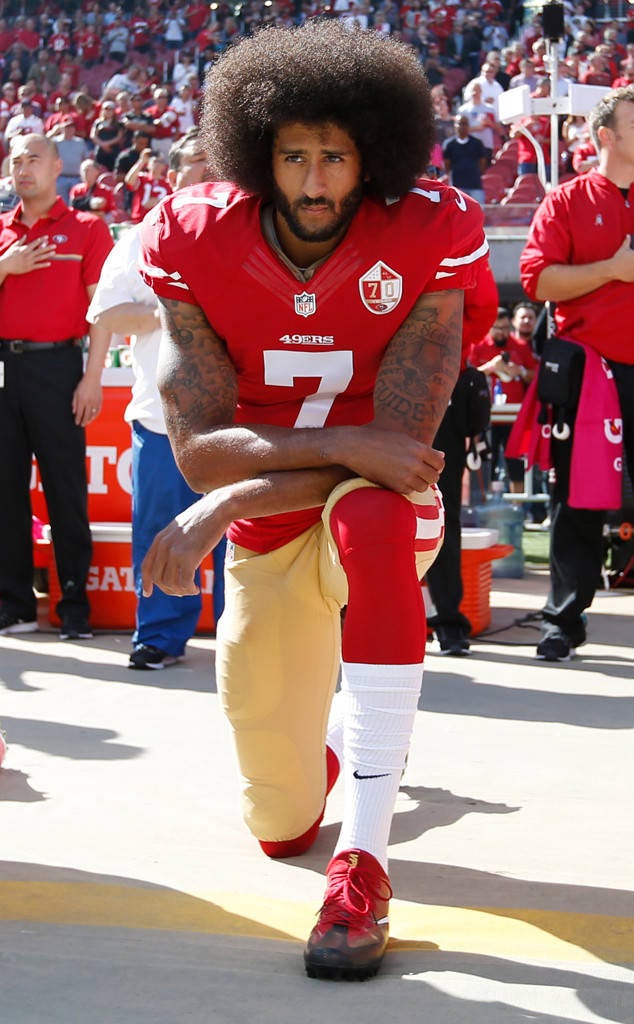

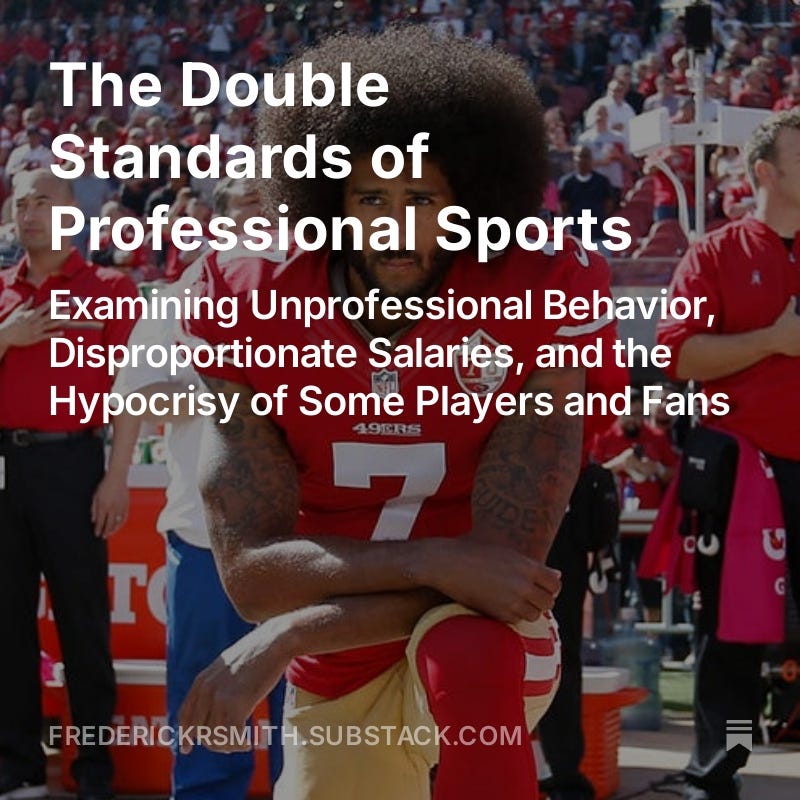


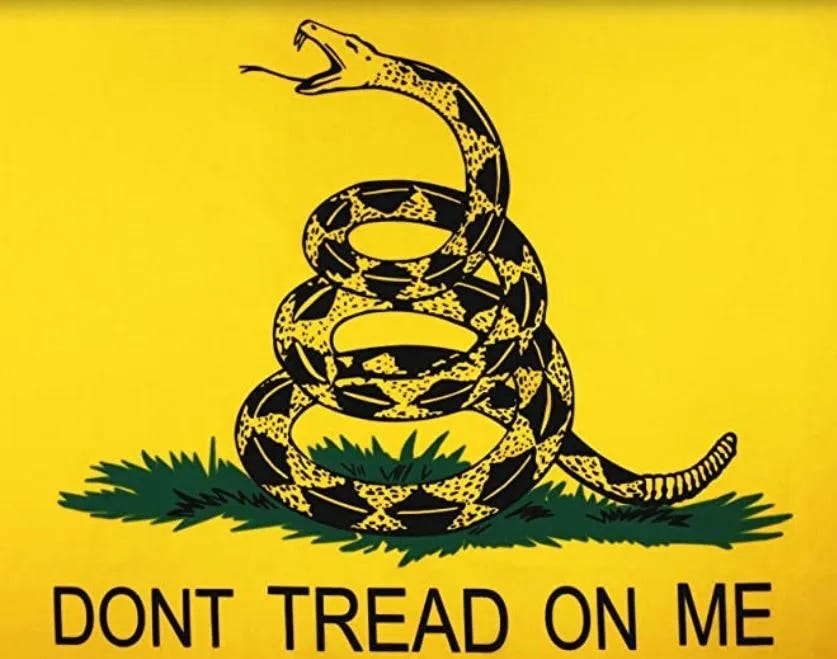





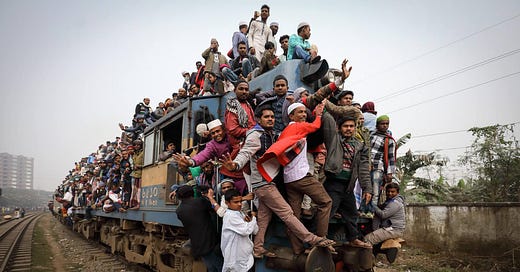

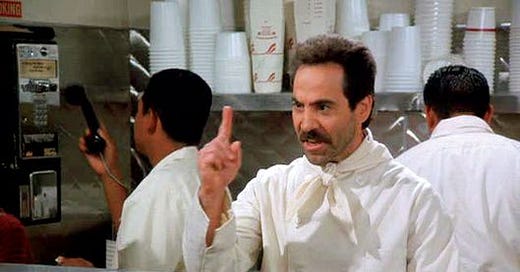

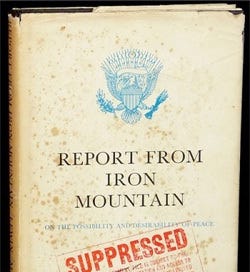

Sports has become one big unflushed toilet... the Olympics included... a monument to narcissism. 50 years ago they played because the loved the game. Now they just love themselves. Just shared with a Note.
Thank you Frederick. You never disappoint.